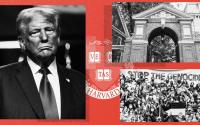The general election on 18 September will change Germany's political landscape permanently, although the outcome is in doubt. Will the Christian Democrats win enough seats to govern with the support of the Liberals, or form a coalition with the Social Democrats? The SPD, facing competition from the new Left party, is in steep decline.
When Willy Brandt resigned as chairman of the Social Democratic party (SPD) in 1987, he doubted it would still exist as a party with mass popular support in 20 years' time (1). His doubts have now proved justified. The Green split in the 1980s was followed this year by the emergence of a party of the left that the polls predict will win 10% of the vote in the general election on 18 September.
The SPD can no longer propose a common programme which will unite the three groups that formed its traditional clientele: the socially protected employees and civil servants of the Rhine capitalist system; the liberal, outward-looking, middle-class post-materialist consumers; and the unemployed and other victims of modernisation.
The crisis of the SPD as a mass party began in 1982 when its coalition partner, the Free Democratic party (FDP), demanded swingeing cuts in social welfare budgets to counter the slowing growth that the Federal Republic of Germany, like all OECD states, had experienced in the 1970s. The Lambsdorff memorandum (2), named after the Liberal minister of economic affairs, called for Germany's economy to be adapted to the dynamics of globalisation. It recommended a combination of cuts in social welfare benefits and wages, the deregulation of working conditions, higher consumer taxes, and the radical reduction of company taxation, especially in the export sector. Knowing he would never be able to impose such a programme on the left wing of his party where the young Turks, Gerhard Schröder and Oskar Lafontaine, set the tone, Helmut Schmidt engineered his own removal as leader.
The Lambsdorff memorandum was a proposal for German economic rearmament for the forthcoming battles in the world labour market. The CDU-FDP coalition, led by Helmut Kohl, was able to implement only part of this radical modernisation project. To go further would have undermined the CDU-CSU's capacity to win mass support, like that of the SPD. The ratio of state expenditure to GDP did not change greatly, but from 1982 to 1998 company income and investments doubled, while the incomes of wage earners stagnated.The Federal Republic's share in world exports rose from 9% to 12%, but domestic demand slackened. The structure of state income changed: in 1970 capital and wealth taxation contributed 30% to the exchequer, while income tax and indirect taxation accounted for 70%. In 2000 the figures were 15% and 85%.
In the 1990s these imbalances were aggravated as the costs of reunification brought increasing debt, especially for the pension and health insurance schemes, where debt rose by 50% between 1990 and 2000 (3). Unlike the absorption of German refugees in 1945, the cost of reunification was paid for by the people at the bottom rather than by a redistribution of funds from the top. The massive investment in eastern infrastructure and the branches of West German banks and commercial chains created only a temporary boom. Faced with the greater productivity of West German industry, eastern companies collapsed, making millions unemployed.
The Kohl era also saw the abolition of wealth tax and part of capital taxation, as well as a reduction in pensions. Telecommunications, railways and postal services were privatised, and electricity deregulated; not to mention the politically profitable development of private television and radio. What the SPD inherited in 1998 was unemployment, and stagnant wages and domestic demand; a growing burden of debt and transfers to the east (4% of GDP); excessive social expenditure (considering world competition); and impoverished social and cultural institutions.
But two parties already co-existed in the old SPD. Lafontaine and the left made impassioned speeches in favour of the reconstruction of the welfare state and the social market economy, redistribution of work, ecological modernisation and a new, fairer international order. In taking up these grand objectives again, the theoreticians of the left gave little thought to the changes of the 1990s.
Accelerating globalisation, new international trade agreements, and the European Commission's hectic pursuit of economic liberalisation had destroyed the basis for a policy of redistribution.
With globalisation in full swing, who could afford debates on a post-materialist, ecological transformation of the economy? And how could elections be won on the only realistic platform in the circumstances - the restoration of social justice through increased taxation of the middle classes and high-income groups? "They'll have to bleed," Joschke Fischer, the leader of the Greens, had once said, but the slogan was soon forgotten.The left lacked practical proposals, and its intellectual supporters looked on with dismay but had nothing to propose either. It was understandable in the circumstances that the SPD should entrust its election campaign to the pragmatic and telegenic figure of Gerhard Schröder.
Unlike his rival Lafontaine, Schröder had no intention of stressing "the conflict between two diametrically opposed views of society". He was out to "improve what could be improved, without changing everything". His target group was the new centre, the well-paid core of the working class and young dynamic entrepreneurs, to whom he had promised growth and renewal. He left it to Lafontaine to hold on to the SPD's traditional supporters: the victims of modernisation and the life-long socialists.
The alliance lasted only four months. Lafontaine became finance minister and took advice from Heiner Flassbeck, one of the few remaining Keynsians on the German economic scene, which had otherwise produced only neoliberals for the past 20 years. He reduced social welfare costs by introducing an environmental tax, announced that those in precarious employment would again be covered by social security, and attempted to influence the interest-rate policy of the central bank, so as to increase the state's room for manoeuvre. Lafontaine rushed into this in his usual way, without proper preparation, facilitating a counter-attack from the financial world's paid media hacks. Disowned publicly by the chancellor, he resigned both as finance minister and as chairman of the SPD.
Having beheaded the opposition, Schröder calmed the situation by awarding a number of posts to leftwingers. As for the SPD members of parliament, they had little choice but to stand by a chancellor with such a narrow majority.Thus ended the struggle between the two party lines.
Meanwhile the financial crisis was making things difficult for the Social Democrats, who resigned themselves to an austerity policy that proved fatal to growth. The central aim of the Red-Green coalition - to modernise the economy on ecological lines by transforming energy resources and stimulating domestic growth - was pursued only sporadically. Opportunities to impose a change of direction on Brussels, a pre-condition for defence of the welfare state, were not taken up, although Social Democrats were in power in 11 EU states.
The chancellor buried leftwing reform proposals by asking a rhetorical question of members of his cabinet: "Is there anyone here who still believes we control the economy?" Schröder took no interest in the more egalitarian Scandinavian countries, with their higher direct taxation, nor in France, where there was more state intervention and a reduced working week, but looked only to Britain. The intellectual vacuum left by the leftwing opposition was filled with the Blair-Schröder paper on modern social democracy (4), which, under cover of inflated rhetoric about "community spirit", "individual responsibility" and the "optimism of the new economy", proposed a free-market system based on deregulation, lower taxation (especially on capital) and harassment of the unemployed. All in the name of unrealistic growth expectations and a redefinition of justice, according to which the term denotes anything that creates growth.
The Red-Green coalition boasted of carrying out the "largest programme of tax reduction in postwar history". It cut taxes on the highest income groups by 8% and corporate taxes by 15%, making a present of tens of billions of euros, at a modest estimate, to large companies. At the same time, as the financial crisis worsened, hundreds of thousands of public sector employees lost their jobs and universities, libraries and other public institutions struggled year after year with government budget cuts. In a context of rising export earnings and shrinking domestic demand, the number of unemployed broke the 5 million barrier in 2004.
The SPD can thank its leftwing capitalists, with their Brioni suits and Cohiba cigars, for the collapse of its electoral support. The unions have distanced themselves from the government. The parliamentary opposition is using its blocking majority in the Bundesrat, the upper chamber, to conduct a populist campaign against the destruction of the welfare state, while the bosses and financial media continue to demand more of the same: a 15% reduction in wages, a one-third reduction in unemployment benefit, more tax cuts, and a 45- or 50-hour working week.
In 2002 Schröder got himself re-elected by skilfully exploiting disastrous floods in Germany, the war in Iraq, and fears of a return of the right. But no one any longer believed his promises of "jobs, jobs and more jobs". In his Agenda 2010 platform, announced in 2003, he stuck to the principle that, if the medicine doesn't work, you increase the dose.
The ensuing Hartz IV plan made drastic cuts in expenditure from 2005 onwards on the "survival of the useless". It deprived the unemployed of more than a year's entitlements and threw them back on social services, while forcing them to agree to work for one euro an hour. Discarding the sacred goal of full employment, the plan reorganised the labour market in line with the neo-feudal order: on the one side, tax-advantaged, legally protected elites who drove the export economy; on the other, the superfluous and those in precarious employment, to be fed at low cost.
Schröder the pragmatist has become the social-democratic executor of the project that Count Lambsdorff used to get rid of the last social-democratic chancellor. The only difference is that the public infrastructure has been privatised rather than developed, not for reasons of economic strategy but to meet acute financial needs.
Unlike its opponents, the SPD has always been membership-oriented. But it has lost a third of its members since 1990, 125,000 of them during the Schröder era. Only 600,000 remain, and a mere 2.8% of party members are under 30. Worse, 8% of its working-class voters abandoned it in the 2002 election to vote for the CDU or abstain (5). The SPD lost control of seven Länder.
After the election, the party will either return to opposition or, if it is lucky, join a grand coalition, probably with an even smaller share of the vote. It will not have the financial resources of its rightwing opponents, whose media supporters beat their drums in favour of strengthening the market economy. It will even lack the support of the unions, whose leader has publicly declared that the labour organisations "have finally lost their partner". In the final analysis, what has broken is the alliance between the middle classes and the little people, those at the bottom of the scale, an alliance that ensured for 40 years that the SPD was able to win a majority.Schröder has reduced a mass party concerned with the interests of the state to a defence group for the new centre, with its well-paid, skilled workers and middle managers, who fear decline but hope that the party will not let things get any worse. Given that profile, the difference between the SPD and the CDU is narrowing all the time.
After his defeat in North Rhine-Westphalia in May, Schröder opted to provoke an early election, fearing that the left wing of his party could rebel or that the situation would be even worse in a year's time. No doubt these motives were compounded by the hope that the great communicator could beat his less experienced and less media-wise opponent, the CDU boss, Angela Merkel, in direct confrontation on TV.
But Schröder must do his sums. His rival, Lafontaine, whom he calls a traitor for criticising his neoliberal policy, has broken the last taboo by agreeing to head a leftwing coalition of the Party of Democratic Socialism, now renamed the Left party, which is supported by the victims of modernisation and those nostalgic for socialism, and is mainly entrenched in the east, and the Electoral Alternative for Work and Social Justice, whose supporters are mostly disillusioned trade unionists and social democrats.
So the social democratic movement of the Brandt-Schmidt era has split irrevocably into three parties: the party of well-to-do workers and public sector employees (SPD); the party of the unemployed, those in precarious employment, and the victims of modernisation (Left party); and the party of urban leftwing liberals (Greens).
This break-up is the consequence of the political failure to master economic globalisation and of the widening social divisions caused by globalisation.It has destroyed the SPD as an integrating force and makes more difficult the task of building a parliamentary alliance of different categories of wage earners to defend a reformed welfare state and propose a strong alternative. As a result, submission to the market will increase. The crisis of the SPD is a sign of the impending crisis of parliamentary representation as a whole.






